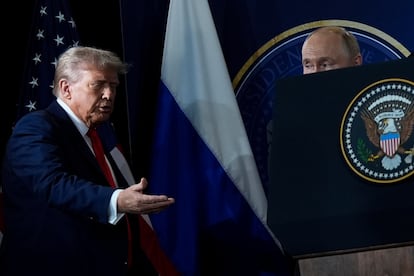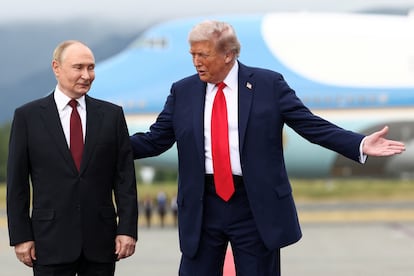Genadi Kostov is a war veteran and janitor in an apartment building in central Kyiv. From his doorstep, he has watched the Russians besiege his city in 2022, and from his doorstep, he has suffered weekly bombardments by the invaders against the Ukrainian capital. On Friday, a few hours before the summit in Alaska between the presidents of the United States and Russia, Donald Trump and Vladimir Putin, Kostov was checking his phone for breaking news about the meeting. What did he expect from the meeting? “It’s basically a meeting between two assholes to decide how to screw each other,” Kostov concluded.
Ukraine doesn't trust Trump, and the Alaska summit has further fueled resentment within its society."Pathetic, painfully pathetic, it's literally comical at this point. Don't doubt it, Trump will go to Moscow," Ilia Ponomarenko, one of Ukraine's most influential commentators, wrote on social media this Saturday."Nauseating, shameful, and ultimately useless," are the first words of an editorial in the Kyiv Independent newspaper about the Anchorage meeting."Eternal shame for the United States," added another prominent Ukrainian civil rights activist, Mikhail Golub.
“In my entire life, I never imagined the US would sink so low,” says Galina Yareha, a 55-year-old food company executive from the Lviv region of western Ukraine, by phone. “Seeing American soldiers rolling out the red carpet for a criminal who has killed so many people is horrifying.” “These two idiots won’t achieve anything,” Yareha says, referring to Trump and Putin. “It won’t be easy for us, but we will resist with Europe.”
“I was hoping that if Putin didn't accept the ceasefire, Trump would send this bastard to The Hague and become the leader of the world,” says Irina Prikhodko, a physical education teacher from Zaporizhia in eastern Ukraine, “but now all we can do is join forces with Ukrainians and Europeans and ignore this couple.”

Bogdan Chernenko was having lunch with some friends at a kyiv restaurant this Saturday. They shared memes on their phones, images that are circulating online mocking the summit. Chernenko, an employee of a security company, was particularly interested in the photographs of the meeting:"Trump doesn't appear as jovial as usual, because he knows he hasn't achieved anything." "Putin, on the other hand, leaves Alaska with his objectives accomplished, with international recognition, and he leaves without having given Trump anything," says Chernenko."It's certainly not good for us."
These demonstrations contrast with the strategy of Ukrainian President Volodymyr Zelensky and his team to curry favor with Trump. The presidential office and the government are relentless in trying to curry favor with the American leader, as they did again this Saturday. Both Zelensky and his Foreign Minister, Andrii Sibiga, have highlighted the White House's efforts to end the war and Trump's promise that, in exchange for a painful peace agreement, they will receive"security guarantees" from the US, without specifying whether they go beyond the delivery of weapons. Trump has ruled out Ukraine's accession to NATO. One of the Kremlin's demands to stop the invasion is that kyiv stop receiving international military support.
The Ukrainian media has not been as sympathetic as its government, and their headlines have featured Trump's Fox News interview shortly after parting ways with Putin. The US president has said that now is the time for Zelensky to accept a deal with Russia, reiterated that Ukraine must cede territory, and insisted that with him in the White House, the years of Joe Biden's presidency,"when billions of dollars were given to Ukraine like candy," are over.
Trump also announced on Fox that the summit went so well that he is postponing his plans to impose economic sanctions on Russia and the countries that purchase its energy resources, the main source of funding for the Russian military industry. Zelensky did ask Trump to agree to impose sanctions on Russia if Putin does not agree to a future meeting between the three. The Ukrainian president insisted on the idea of a truce:"The attacks must cease as soon as possible, both on the front lines and in the air, as well as against our port infrastructure."

The final straw was Trump's final message on the social network Truth, in which he announced that there had indeed been an agreement with Putin: the immediate truce demanded as a preliminary step to ending the war, a prerequisite for months according to Washington, is now water under the bridge. According to Trump, Zelensky and the European allies have reportedly agreed that a ceasefire is no longer necessary to negotiate peace.
This means that peace will be negotiated while fighting continues. And on the war front, Russia is calling the shots. Ukraine suffers from a shortage of troops and weapons compared to the invading army. Soldiers from the National Police's special forces and officers from the 155th Mechanized Brigade of Ukraine confirmed to EL PAÍS in Donetsk last week that they are experiencing a shortage of ammunition due to the halt in US military support.
Since 2025, European powers have been Ukraine's main military supporter, ahead of the United States. The Trump White House has approved just over €1 billion in arms transfers, subject to payment from its European NATO allies. The figure is much lower than the pace of support Biden maintained.
“Putin’s great victory”
“This is a major victory for Putin. Trump has fully embraced his narrative that a comprehensive peace deal is better than a quick ceasefire,” Janis Kluge, deputy director of the German Institute for International and Security Affairs, warned in an analysis. “As feared: no truce, no peace, no real progress. A clear victory for Putin, and no sanctions. For Ukraine, nothing; for Europe, a profound disappointment,” wrote Wolfgang Ischinger, a German diplomat and director of the Munich Security Conference, in an analysis.
“What has happened is that Putin has managed to convince Trump that any ceasefire effort will fail, and he has won Trump’s support that the root causes of the conflict must be addressed,” warned Tatiana Stanovaya, a scholar at the Carnegie Center on Russia and Eurasia.
What happened confirms a long-standing distrust of Ukraine, dating back to the start of Trump's term in January. The Kyiv International Institute of Sociology (KIS) established in December 2024, based on its surveys, that only 21% of Ukrainians considered the Republican's immediate presidency to be negative for their interests. The percentage had risen to 72% in June. The US president has maintained a strategy of pressure on Kyiv and conciliation with Moscow, imposing draconian trade agreements on Ukraine, such as the mineral exploitation pact, and a drastic reduction in military aid for Ukrainian troops.
Former Russian President Dmitry Medvedev celebrated the outcome of the summit on his Telegram account. “The White House leader has agreed to de-escalate pressure on Russia,” Medvedev emphasized, “and, most importantly, the disappearance of the ceasefire as a condition “shows that negotiations are possible while the special military operation [the war] continues.”
Medvedev's triumphalism is especially painful because it was his tweet warning Trump of an escalation of war that led the US president this August to move two nuclear submarines close to the Russian coast.
Trump's move was greeted with raptures by Andrii Yermak, head of the Ukrainian president's office."We all watched wrestling [the US wrestling show], when Ric Flair, Hulk Hogan, the Undertaker, and Stone Cold were fighting. It was a time of power and personality," Yermak recounted, before adding:"What Trump did to Medvedev is the classic Undertaker neckbreaker. Calm, powerful, confident, as it should be." This message from Zelensky's right-hand man was not the first of its kind and was widely criticized for being excessively flattering to Trump. This is quite the opposite of what Ukrainian citizens think.

